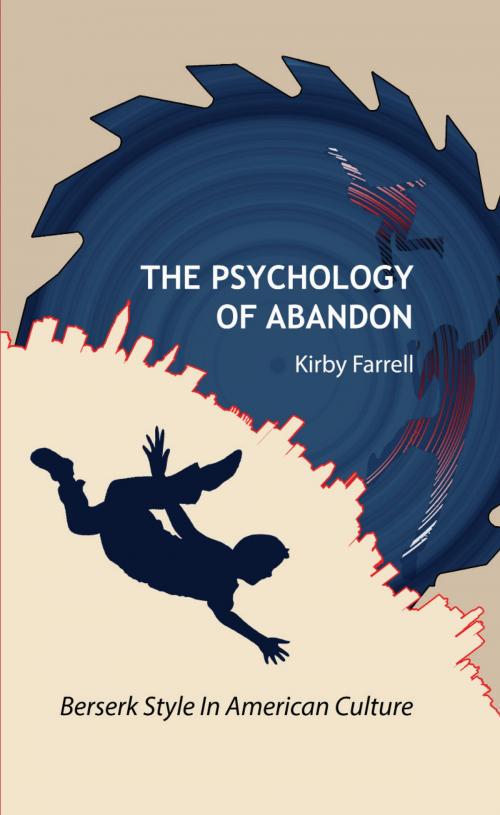The Psychology of Abandon
Berserk Style in American Culture
Nonfiction, Social & Cultural Studies, Social Science, Human Services| Author: | Kirby Farrell | ISBN: | 1230000907903 |
| Publisher: | Levellers Press | Publication: | January 25, 2016 |
| Imprint: | Language: | English |
| Author: | Kirby Farrell |
| ISBN: | 1230000907903 |
| Publisher: | Levellers Press |
| Publication: | January 25, 2016 |
| Imprint: | |
| Language: | English |
When behavior becomes a cultural style, berserk abandon is terrifying yet also alluring. It promises access to extraordinary resources by overthrowing inhibitions. Berserk style has shaped many areas of contemporary American culture, from warfare to politics and intimate life. Focusing on post-Vietnam America and using perspectives from psychology, anthropology, and physiology, Farrell demonstrates the need to unpack the confusions in language and cultural fantasy that drive the nation’s fascination with berserk style.
Kirby Farrell is professor of English at the University of Massachusetts, Amherst. He is the author of Post-Traumatic Culture and other books of literary and cultural criticism, as well as several novels. He is a regular contributor to Psychology Today online.
Front cover design by Helena K. Farrell, for Tacit Muse
“This book amazes me with its audacity, its clarity, and its scope. We usually think of ‘berserk’ behaviors—from apocalyptic rampage killings to ecstatic revels like Burning Man—as extremes of experience, outside ordinary lives. With rich evidence and fascinating detail, Farrell shows how contemporary culture has re-framed many varieties of the berserk into self-conscious strategies of sense-making and control. Beyond real but remote actions of the intoxicated or deranged, ‘berserk style’ has become a common lens for organizing modern experience and an often-troubling resource for mobilizing and rationalizing cultural and political action. This landmark analysis both enlightens and empowers us.” —Les Gasser, Professor of Information and Computer Science,
University of Illinois, Urbana-Champaign
“Drawing from a storehouse of cinema, news stories, ads, cartoons, literature, and lyrics from the post-Vietnam era, Farrell has painted a masterful, disturbing portrait of the American subconscious.” —James Aho, author of Sociological Trespasses
“Farrell has undertaken yet another fascinating journey. He explores phenomena such as Columbine, Mike Tyson, ‘Going Postal,’ and Wall Street excesses to reveal an underlying style of thinking that is pervasive in American culture. As always, he is a provocative and highly readable cultural critic.” —Don Dutton, Professor of Psychology, University of British Columbia
When behavior becomes a cultural style, berserk abandon is terrifying yet also alluring. It promises access to extraordinary resources by overthrowing inhibitions. Berserk style has shaped many areas of contemporary American culture, from warfare to politics and intimate life. Focusing on post-Vietnam America and using perspectives from psychology, anthropology, and physiology, Farrell demonstrates the need to unpack the confusions in language and cultural fantasy that drive the nation’s fascination with berserk style.
Kirby Farrell is professor of English at the University of Massachusetts, Amherst. He is the author of Post-Traumatic Culture and other books of literary and cultural criticism, as well as several novels. He is a regular contributor to Psychology Today online.
Front cover design by Helena K. Farrell, for Tacit Muse
“This book amazes me with its audacity, its clarity, and its scope. We usually think of ‘berserk’ behaviors—from apocalyptic rampage killings to ecstatic revels like Burning Man—as extremes of experience, outside ordinary lives. With rich evidence and fascinating detail, Farrell shows how contemporary culture has re-framed many varieties of the berserk into self-conscious strategies of sense-making and control. Beyond real but remote actions of the intoxicated or deranged, ‘berserk style’ has become a common lens for organizing modern experience and an often-troubling resource for mobilizing and rationalizing cultural and political action. This landmark analysis both enlightens and empowers us.” —Les Gasser, Professor of Information and Computer Science,
University of Illinois, Urbana-Champaign
“Drawing from a storehouse of cinema, news stories, ads, cartoons, literature, and lyrics from the post-Vietnam era, Farrell has painted a masterful, disturbing portrait of the American subconscious.” —James Aho, author of Sociological Trespasses
“Farrell has undertaken yet another fascinating journey. He explores phenomena such as Columbine, Mike Tyson, ‘Going Postal,’ and Wall Street excesses to reveal an underlying style of thinking that is pervasive in American culture. As always, he is a provocative and highly readable cultural critic.” —Don Dutton, Professor of Psychology, University of British Columbia















